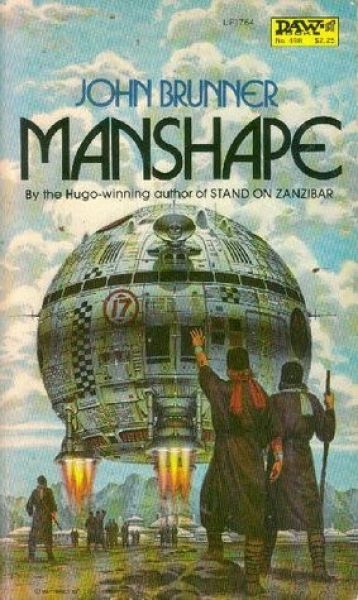Hello Again
Manshape
By John Brunner

28 May, 2024
John Brunner’s 1982 Manshape is a stand-alone science fiction novel.
Jorgen Thorkild oversees the Bridge System, which allows people to step from one world to another, provided only that both worlds are spliced into the interstellar transportation network. Physical challenges now solved, that leaves only cultural impediments standing between all the human worlds and a single, unified society.
Pre-Bridge, superluminal travel allowed humans to establish colonies in other star system. Afterward, routine contact between all but the nearest worlds proved impractical. Thus, the colony worlds had centuries to go their own way. Ever since the Bridge System was developed, Earth has been methodically recontacting its lost children. The task is nearly finished. Azrael and Ipewell may be the last two colonies not yet part of the system.
Ipewell is a curiosity. Calamity on founding left the colony without the sperm and ova banks and artificial wombs conventionally used to ramp up human populations to viable levels. Therefore, fertility was prioritized. Result: a planet ruled by mothers, one where men are oppressed. This is likely to change now that Ipewell is part of the Bridge System.
Azrael is another oddity. Its people descend from a peculiar snake-handling cult and their world-view is best described as nihilistic. Azrael’s government finds the prospect of disrupting Earth’s placidity with persuasive cult leaders amusing. Contact is unpleasant and in the end, unproductive; the religious fanatics of Azrael declare that they have no interest in joining the Bridge System.
What could explain this bizarre rejection? Thorkild and his colleagues must find out. Alas, overworked Thordkild’s job is an easy target for Azraelite manipulation. Cue sudden onset mental collapse for poor Thorkild.
~oOo~
There was considerable potential in Brunner’s chosen plot seeds. Even if Earth’s confidence that of course its colonies would desire reintegration were to be correct (something that deserves more examination than it receives in this books), that does not mean that accomplishing this would be straightforward. History is full of examples of would-be federalist unions that fell apart due to regionalist divisions that were minor compared to those between long-isolated worlds1.
Alas, Manshape turned out to be a lesser Brunner effort. The novel is positively quaint for something published in the extremely modern year of 1982. Its values are old fashioned. Having raised any number of interesting questions, the novel devolves into shallow philosophizing and facile solutions. It is a curious reversion to Brunner’s early days.
In part, this may be because the novel’s 159 pages did not provide Brunner with sufficient room to fully explore this setting. More likely, the issues arose because Manshape is an expansion of 1964’s Bridge to Azrael AKA Endless Shadow. Manshape may be 150% longer than Bridge but its 1964 bones are clearly visible2.
Reworking older works was nothing new for Brunner. A decent income demanded relentless productivity. Thus, 1959’s The 100th Millennium became 1968’s Catch a Falling Star, 1960’s Slavers of Space became 1968’s Into the Slave Nebula, and 1963’s The Astronauts Must Not Land became 1973’s More Things in Heaven. However, this practice was atypical for Brunner at this stage of his career, perhaps for good reason.
In fact, April 1975 to February 1983 was an odd period for Brunner. Whereas Brunner had previously been in the habit of delivering several novels a year, those eight years saw only three SF novels, none of them successes. It’s almost as if his attention was elsewhere. And it was. But if you want to learn what so distracted Brunner, you will have to wait until July’s review.
Manshape is available here (Amazon US), here (Amazon Canada), here (Amazon UK), here (Apple Books), here (Barnes & Noble), and here (Chapters-Indigo). I did not find Manshape at Words Worth Books, probably because the novel is only available as an ebook.
1: Obvious examples of federal states unable to withstand regional ambitions: Gran Columbia and the West Indies Federation. Canada was almost a third example: Canada’s first separatist movement sprang up founded almost immediately after Confederation.
2: Reminiscent of 1981’s Second Game, which, like Manshape, was published by DAW, and which, like Manshape, was an expansion of an earlier work. It added length without adding much in the way of value. Expanding older works can be tricky.
